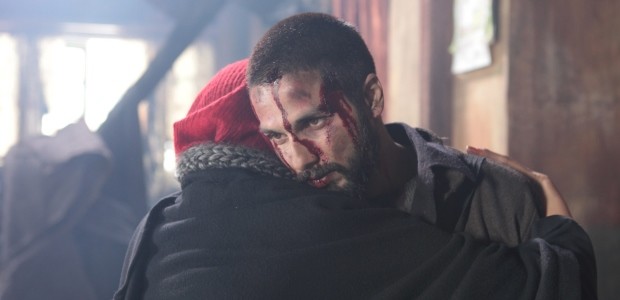Haider is the third installment of Vishal Bhardwaj’s Shakespearean trilogy after Maqbool (Macbeth, 2003) and Omkara (Othello, 2006). Adapted from Hamlet, Bhardwaj again sets Haider in contemporary India, this time in an insurgency-hit Kashmir of mid-1990s. In evidence of his growing stature as an auteur, Bhardwaj lays thick into the ample plot and characters of Shakespeare’s longest and complicated play, creating a movie that is as accomplished as it is ambitious. Though Bhardwaj the director is flawless, it is Bhardwaj the writer that surfaces as the tour-de-force of the movie – the screenplay and dialogues are top-notch, giving the movie a rich gravitas that its subject matter deserves.
The movie starts with a title-card setting the scene in 1995, when the Indian Army and insurgents were fighting over their definitions of freedom in a battered Kashmir. Dr. Hilal Meer (Narendra Jha) is taken into custody by the Indian Army for allegedly supporting the insurgents. His son Haider (Shahid Kapoor), a poet, returns from university to find his seemingly unfazed mother Ghazala (Tabu) singing for his dancing uncle Khurram (Kay Kay Menon). Feeling betrayed and lost, and with only his childhood sweetheart Arshia (Shraddha Kapoor) for support, Haider is stuck on a fine line between revenge for his father and love for his mother.
The story of Haider takes a liberally adapted route to reach midpoint after which it is relatively loyal to the bard. The screenplay & dialogues are the mainstay of the movie, providing the rewarding experience of a great film. Bhardwaj and Basharat Peer, a Kashmiri journalist credited as the screenplay’s co-writer, interweave the movie’s drama with the reality of Kashmir’s recent violent past. They do this without attempting to be politically-correct or dumbing down the players to caricatures of good and evil. Kashmir is both beautiful and dangerous; the Indian Army is not painted in an ethereal light and the militants are fighting their own battle – neither as heroes nor villains. The political angle gives the movie a depth of genuineness usually lacking in mainstream Hindi cinema, especially those set in the north Indian state.
The good work in Haider isn’t limited to the movie’s screenplay and dialogues; it is a masterclass from Vishal Bhardwaj in filmmaking. Vividly lensed by Pankaj Kumar (Ship of Theseus), the movie continues the tradition of Bhardwaj films being a visual delight (He famously worked with Oscar winner Guillermo Navarro for his 2007 AIDS short film Blood Brothers). The songs and background score, composed by Bhardwaj, colour the movie in a distinct culture – especially the song “Bismil” envisaged as a performance art, in place of the play that Hamlet stages to establish the guilt of his uncle.
As with the inspiration of the movie, the burden to carry off the dramatics falls on the actors, and the troupe doesn’t disappoint. Shahid Kapoor, as the titular conflicted “prince”, pours his passion into the role of a lifetime, his best since Bhardwaj’s Kaminey. It is a challenge to tackle one of the most complex characters in literature, something that Kapoor pulls off with élan. His character’s descent into madness (fake and real) embodies the struggle of “to be or not to be”, emphasized in one of Haider’s monologues. In fact, the famous line is delightfully translated and paraphrased a few times in the movie, once even for comic effect. The rest of the cast also sinks their teeth into their well-defined parts: Kay Kay Menon, Irrfan Khan, Shraddha Kapoor and Narendra Jha play definitive versions of their characters. Rounding them off is the brilliant but elusive Tabu as Haider’s mother Ghazala in a wonderfully evocative performance. Subtle yet powerful, her presence underlines the theme of conflict in the movie: love vs hate, vengeance vs forgiveness and innocence vs guilt.
The mark of an intelligent film is its repeat value, and Haider certainly has it. Multiple viewings unlock the intricacy of the film’s symbolism (e.g. Arshia’s red scarf), the foreshadowing of events and the wicked wit of the director. Bhardwaj treads the cinema landscape with the surefootedness of a filmmaker fluent in his craft. It took him 11 years, but the trilogy is now complete with the trickiest of Shakespeare’s plays. Yet, at the age of 49 years, Vishal Bhardwaj has enough of a career ahead of him to continue delighting us with great cinema.
Rating: 




